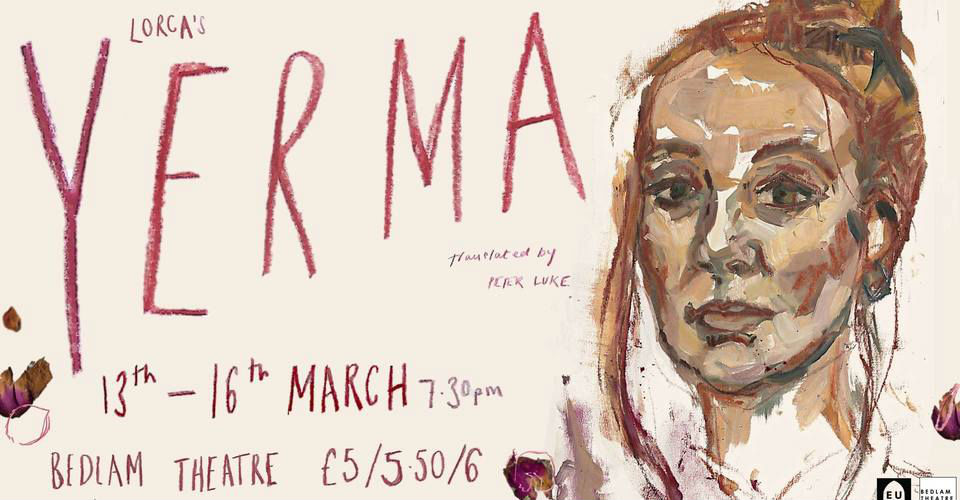Barren… Empty… Withered… Useless…
The unhappy childlessness of the protagonist in Lorca’s 1934 play is not allowed to be a private, personal sorrow. It’s subject to judgement (and self-judgement). It attracts slurs like those above. It’s taken as fair game for others’ prurience and gossip. However she feels about it herself, the childlessness of a married woman is seen as a fit topic for village pump tittle-tattle.
Lorca’s original might not be entirely benign towards its lead character. It might be implying outrageous things about the effects of childlessness on a woman’s mental state and the lengths it might drive her to. But it’s clear from this EUTC student production, directed by Laura Hounsell and Jane Prinsely, where our sympathies should lie. Yerma, played engagingly by Scarlett Stitt, is a woman of strength and principle, with hopes for her life that are not unreasonable. But she’s buffeted by cruel, outside forces – a callous husband, an intrusive community, the constrictions of her time.
It’s taken as given that we’re to apply a modern feminist reading to this, although the production has kept the play to its original setting. Set design (Ben Saunders and Mark Fernandez) presents a rustic scene with trees that double as maypoles and the pillars of Yerma’s wooden house. Costume (Katie May Anderson) is traditional. A dusky yellow/orange light (Nancy Strahan and Emma Hunt) illuminates.
Stitt’s performance is obviously key. It’s palpable how othered she feels, the distance her childlessness is putting between her and other women. As the piece progresses, so does her desperation, though more world-weariness and hard-won wisdom would enhance the performance. Even at her lowest ebb, there’s a brightness about her, as if the gravity and permanence of her predicament has yet to fully dawn.
Husband Juan (Gordon Steakhouse) also misses some darkness. He ratchets things up for angry moments but feels neither domineering nor particularly set in his ways. When he talks of his disinterest in children, it’s in a manner that suggests a boyish ambivalence to the prospect lurks underneath. With a fair wind, you sense he might even change his mind. This tips the power balance towards Yerma and means the dialogue is sometimes at odds with the on stage chemistry.
The chemistry is also askew with fellow shepherd and Yerma’s erstwhile lover, Victor (Jacob Baird). He looks the part, with a Poldarkian mop of wavy hair and troubadourian folk singing, but his body language isn’t hinting at frustrated lust quite the same way the dialogue is.
The pair’s musical duet is sweet though, as are all the folk music interludes (composed by ensemble players Eve Simpson and Ally Shilson). An ensemble ceilidh scene has an enlivening effect too. Ensemble acted scenes on the other hand lack dynamics. No-one seems to be revelling in the gossip quite enough.
To modern eyes, Yerma (the play, not the character) feels slightly one-dimensional. Its narrow focus, straight narrative and lack of interweaving plotlines don’t leave much work for the audience. But you can see why it’s been chosen by the company and they make a decent fist of it. Women’s approach to motherhood continues to be scrutinised in all sorts of ways and while a married woman without children might not be viewed quite as suspiciously now as then, there’s still something that resonates – the speculation over her sex life, the suggestion she’s in the wrong, even some of the superstitions… No longer do women meet old pagans at night in graveyards to pray for babies, but the internet and magazine racks are full of mumbo-jumbo tips on conception. This student production wants for a bit more fire and spark in places, but invites some interesting reflections.
